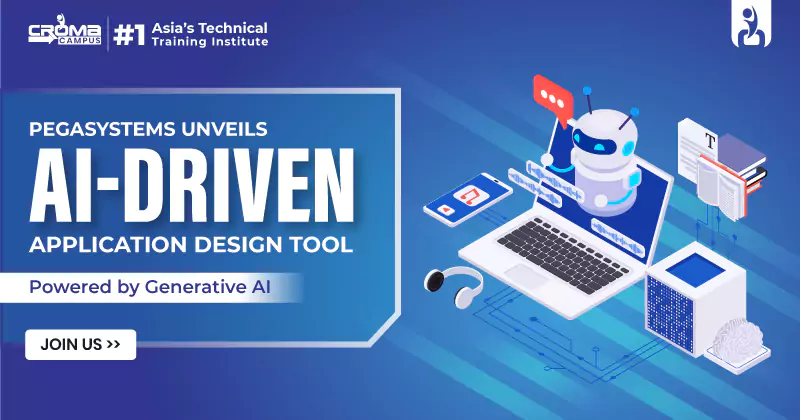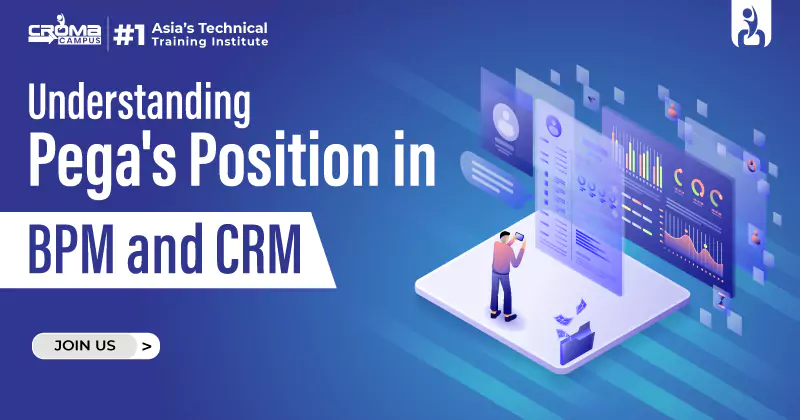Understanding Pega's Position in BPM and CRM
4.8 out of 5 based on 7574 votesLast updated on 26th Jul 2024 12.36K Views
- Bookmark

Pegasystems leads in BPM and CRM with robust automation, AI-driven insights, and customer engagement tools, empowering businesses to excel.

To begin with, Pega is a highly popular platform useful for managing enterprise AI decisions and workflow automation. Along with this, using the Pega tool in business unlocks business-transforming outcomes with real-time optimization.
Significant Features of Pega
The Pega tool comes with various features for dealing with business process management (BPM) and customer relationship management (CRM) needs. Pega facilitates low-code development and helps in developing a visual development environment. It facilitates users with a minimal coding experience and helps build and automate workflows. Pega provides businesses with drag-and-drop functionality and offers various pre-built components to simplify application development. Furthermore, Pega facilitates low-code development and is a versatile platform for organizations seeking to streamline operations. To further know about it, one can visit Pega Course. Apart from these, the significant features of the Pega tool are given below.
- Rapid Application Development - Pega facilitates rapid application development, allowing businesses to quickly deploy solutions to address changing needs without extensive coding cycles.
- Process Modelling - It provides various kinds of intuitive tools for visually modeling and automating complex business processes. This approach results in improving transparency and overall efficiency.
- Case Management - This solution is capable of handling unstructured processes with its case management capabilities. It also facilitates dynamic decision-making.
- Business Rules Management - It ensures that the rules can be embedded within workflows. Furthermore, it allows consistent decision-making and adherence.
- Customer 360 - This solution also provides a unified view of all customer interactions. Thus, ensuring that businesses can deliver personalized experiences.
- Artificial Intelligence (AI) - Pega also comes with AI capabilities like chatbots for automating customer interactions and personalize service.
- Integration Capabilities - This software tool is capable of integrating with the existing enterprise applications. Along with this, it eliminates the data silos and streamlining information flow.
- Adaptive Intelligence - The Pega tool helps in utilizing real-time data and analytics. Along with this, it improves the processes and customer interactions.
Uses of Pega in BPM and CRM
Pega is a popular software solution used in both Business Process Management (BPM) and Customer Relationship Management (CRM). This software tool comes with various capabilities which make it ideal for both BPM and CRM. Here are the important uses of Pega in both BPM and CRM.
Uses of Pega in BPM
- Streamlining Workflows - Pega in BPM helps in automating complex workflows. This approach results in eliminating manual tasks and inefficiencies.
- Improved Efficiency - It automates the tasks and processes and reduces the processing times. Along with this, Pega also boosts the overall business efficiency.
- Enhanced Decision Making - Pega facilitates seamless integration with business rules. Along with this, it allows organizations to make data-driven decisions.
- Flexibility and Adaptability - This tool comes with a low-code approach that empowers businesses to adapt and adjust processes quickly to meet changing needs, without extensive coding requirements.
- Improved Compliance - It ensures that the regulations and industry standards are met by embedding compliance rules within workflows.
Uses of Pega in CRM
- Personalized Customer Interactions - This tool is capable of leveraging AI and case management. Along with this, it personalizes the overall customer interactions across all touchpoints.
- Real-Time Customer Service - It provides real-time access to customer data. Along with this, Pega allows the agents to resolve issues efficiently and deliver exceptional service.
- Improved Customer Journey - It automates and optimizes the customer journeys. Thus, ensuring a smoother and more positive customer experience.
- Unified Platform - It is a unified platform that helps in managing all sorts of customer interactions. Along with this, Pega also eliminates the data silos.
- Increased Customer Loyalty - Pega in CRM facilitates great customer loyalty and provides personalized experiences and efficient service.
You May Also Read These Posts:
Major Advantages Of Pega Systems
Career Opportunities in Pega
Pega is a leading technology and various companies are using it. There is a high demand and growing market for Pega developers and it’s expected to rise even more in the near future. Thus, ensuring numerous job opportunities all over the across industries. Along with this, a career in Pega offers lucrative salaries and career versatility. It allows you to choose a career track that aligns with your interests and skill set. Above all, Pega facilitates low-code development which makes it easier to learn and use compared to traditional coding languages. Many institutes provide the Pega Certification course and enrolling in them can allow you to start a career in this domain. Here are some of the leading careers you can explore after learning Pega.
- Pega Developer - They have to work on designing, developing, and testing the Pega applications through the low-code tools and functionalities.
- Pega System Architect - They have to deal with the complex Pega projects and ensure scalability along with integrating the Pega with existing systems.
- Pega Senior Developer - This job requires advanced Pega skills and experience. They have to work on the lead development teams and tackle the Pega configurations.
- Pega Business Analyst - The job role of these professionals is to bridging the gap between business needs and Pega solutions. They also translate the business requirements into actionable configurations.
- Pega Business Process Consultant - This job role requires deep business process knowledge and expertise in Pega. Their job is to analyze the processes and identify optimization opportunities.
- Pega Implementation Consultant - They have to help the clients through the Pega implementation process. Furthermore, they also have to manage the project lifecycles and train the users.
- Pega Support Engineer - These professionals provide businesses with the technical support for implementing Pega. They also troubleshoot issues and ensure system uptime.
Conclusion
Pega offers a powerful solution for BPM and CRM needs. Its low-code development environment empowers users to build and automate workflows. Furthermore, its robust features like case management and AI cater to complex processes and personalized customer interactions. This translates to a high demand for Pega professionals across industries, with career paths in development, business analysis, implementation, and support. In conclusion, if you're looking for a versatile and rewarding career, Pega is definitely worth exploring.
Subscribe For Free Demo
Free Demo for Corporate & Online Trainings.
Your email address will not be published. Required fields are marked *












 Master in Cloud Computing Training
Master in Cloud Computing Training